Last Saturday night, Evan Willer entered the wrestling ring for the first time since he was a high school sophomore in Eugene. In those six years, much had changed.
“Last time I was wrestling, I wasn’t fully me,” he said. “I wasn’t on hormones, and I wasn’t confident in myself…it feels gender-affirming to be a part of this.”
Willer was a part of T Boy Wrestling, a Los Angeles-based wrestling showcase that tours the country, offering transmasculine and nonbinary people the opportunity to compete in a sport fully as themselves. In front of 600 screaming fans in the Northeast Portland event space Avenue Portland, Willer took the mat as his drag persona, King of Hearts.
Willer, clad in white short shorts with yellow polka dots, took the ring against opponent the Butchbreaker, also from Eugene, in the second match of the evening. The duo grappled for a second before Willer took control, driving the Butchbreaker to the mat and fighting for a pin to win the first round.
Willer was one of about 150 trans men and nonbinary people who competed over two nights—the second added due to popular demand—in a show that blends real wrestling principles and athleticism with WWE-level theatrics. Some wrestlers were there to test their brawn in authentic competition; others joined a mock-fight performance bracket that underlined pro wrestling’s inherent flamboyance and homoeroticism.
“The guys I used to wrestle with definitely didn’t like to acknowledge that and would call each other homophobic slurs all the time,” Willer says. “I’m so excited for how homo we can make this.”
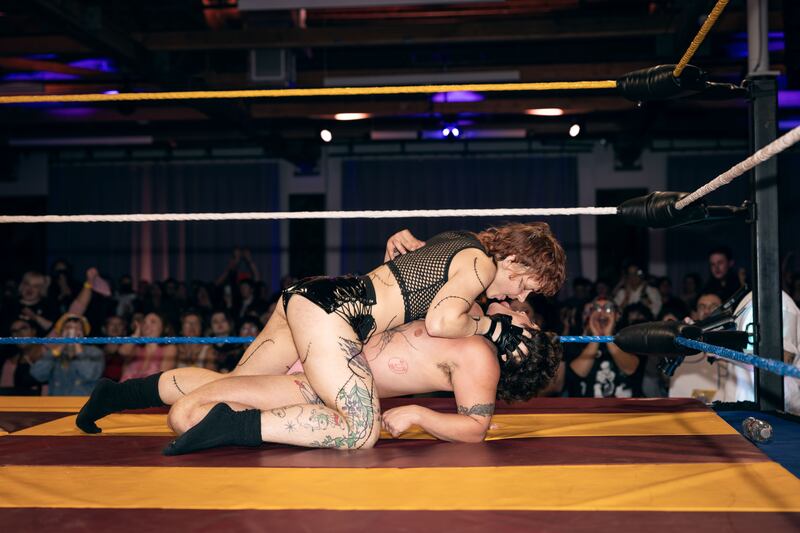
Since its simple start just over a year ago in L.A., T Boy Wrestling makes space for people to find their boys—whether that’s fellow trans men, nonbinary people, butch lesbians or gender-nonconforming people (and as long as cis dudes act right, the more the merrier).
“My favorite movies as a kid were The Sandlot and Teenage Mutant Ninja Turtles—any movie where it’s a group of boys, ” T Boy Wrestling co-founder Adam Bandrowski tells WW. “It’s something that I always wanted to have: a group of my boys. We could go to the gym or the bar or go out to a gay club. I just wanted to find that.”
The two make it possible for people in other cities to find that place, too—and Portland, to no one’s surprise, has a keen appetite for it. T Boy Wrestling proved to be one of the local LGBTQ+ community’s buzziest events of the year, with after-parties thrown at Central Eastside bars Doc Marie’s and Dirty Pretty. That’s in no small part because the wrestlers were Oregonians, who applied to enter T Boy Wrestling when it swung through town. Once chosen, contestants could attend optional trans-led wrestling training in the weeks leading up to their event, or just show up the day of ready to rumble. Portland’s T Boy Wrestling trainer, Charlie Sharif, led weekly practices at Southwest Portland Martial Arts ahead of the Portland shows.
Willer says there were about 35 other people at the practice he attended. “It was really cool to see so many trans men crowded into one room practicing wrestling,” he says. “There was a real sense of camaraderie.”
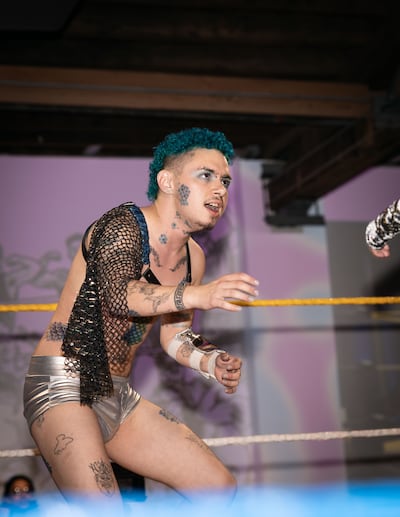
For a Portland man named Dionysus Chilcote, the event was a rough-and-tumble opportunity he didn’t get in his childhood—as well as a chance to feel out the direction of his drag persona, Dickus Hartigan Volt.
“There’s not a lot of places and a lot of events that will specifically center trans men,” Chilcote says. “Sometimes we deserve the spotlight, too. Sometimes it’s cool to talk about dude stuff.”
Chilcote is the founder of Trans Guys Gather PDX, a monthly social event where (as the name suggests) transmasculine people gather for crafts, games and potlucks. The group, which celebrated its first anniversary in September, hosts low- or no-cost events where trans people can build community and brotherhood across a broad age range. Chilcote says he admires similar transmasc-focused groups, like Bandrowski and Mich Miller’s Trans Dudes of LA.
“The things they are doing at such a large scale are just groundbreaking for the transmasc community,” he says. “In the last month, more people have talked to me about T Boy Wrestling than I’ve ever heard talk about trans things to me in real life. To give such visibility to trans folk and transmascs in a time like this is really important work.”
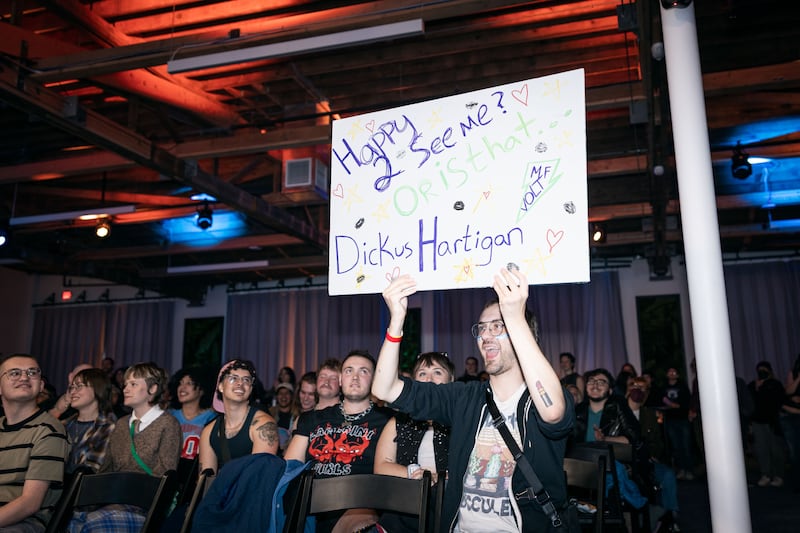
Bandrowski, Miller and Chilcote’s work organizing events for trans people goes further than entertainment and even community building. Bolstering trans and nonbinary people in a public space at this moment is a form of activism. All three of them feel the significance of events like T Boy Wrestling in a political climate where trans people are increasingly scapegoated by institutions that normalize harassment and deny public resources to them.
“Building in our own world at the same time as what’s going on is so important,” Miller says. “If we can’t change the Olympics, we can create our own spaces to experience joy and athleticism—or art or whatever it is you want in life.”
The duo determine locations largely based on demand, which currently comes from across the country. But Trans Dudes of LA faces political and economic constraints touring its event to areas openly hostile to trans people. While Bandrowski and Miller want to take T Boy Wrestling to the South, for example, they need to stick to more liberal areas for budgetary and safety reasons. It’s not forever, Miller says, but for now it is reality.
“I would love to go to Texas or Florida and show it out,” Bandrowski says, “but right now we don’t have the funds to hire that level of security.”
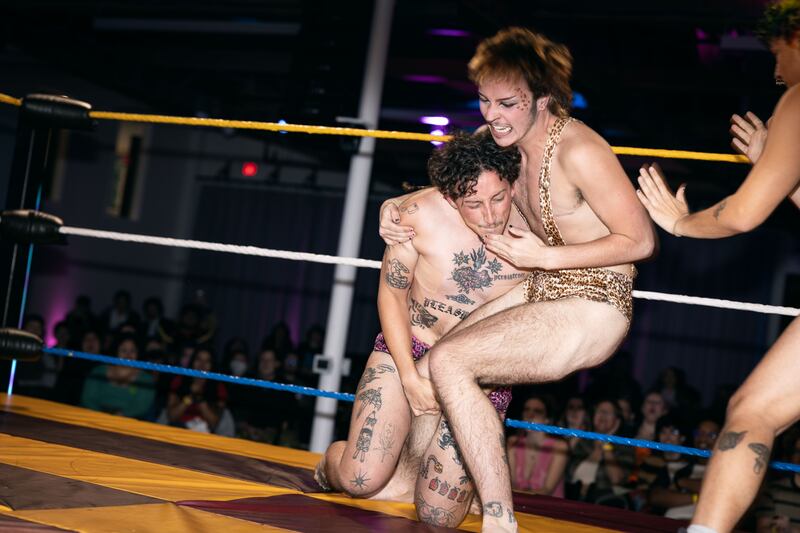
In the past decade, state and federal legislative efforts have increasingly tried to target trans people, denying us access to public restrooms and participation in sports teams that align with our gender and from accessing gender-affirming care. The larger social and political climate only furthers these efforts, with mainstream media outlets and right-wing influencers and politicians pushing fearmongering and scapegoating narratives about trans identity.
“It’s really important to be world-building in that way, at the same time as everything else,” Miller says. “This is me and Adam’s best weapon against the other forces. It’s kind of like fighting AKs with balloons, but we work harder the worse it gets at making this more fun.”
Miller also says that wrestling is also powerful on a personal level. The sport helps trans people feel present in their bodies—and, as T Boy Wrestling judge Fran Tirado said on Saturday, it creates space for a queer “masculinity that we can root for.”
“It is a way for trans people to feel empowered in their body, to feel connected to their body, to be engaging with other bodies in a way that is positive,” Miller says.
Wrestling’s widespread popularity as a sport and performance art creates space for different forms of transmasculine expression, Miller says. They liken enthusiasm for this event with drag’s popularity. That’s not surprising since, especially on the performance side of things, wrestling is pretty much indistinguishable from drag. Pro wrestlers don an exaggerated, campy persona and self-styled costumes that reinforce their personas. Even those competing in the traditional matches take stage names and personas, playing with gender by performing hypermasculinity in the ring.
“There’s something so subversive about [wrestling], there’s something fun about it, there’s something absurd about it,” Miller says.
Or, as guest judge and drag celebrity Asia Consent said Oct. 11: It’s time to “be a fucking weirdo.”
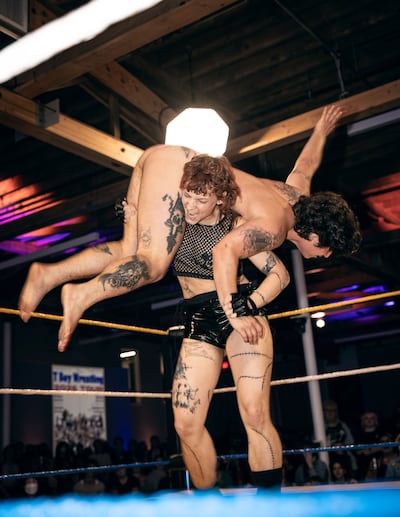
That wasn’t a problem. A wrestler named Cheese pulled out a cheese stick balanced on the corner ropes of the ring and ate it while a 600-spectator-strong crowd cheered. Cheese then pelted their opponent, Ape Spit, with Kraft singles before taking them down to secure a match victory.
It’s also homoerotic. “There’s a thrill from it,” Miller explains. “There’s so many girlies that want to watch two hot dudes make out with each other.”
That flirty vibe extends to the audience experience. Chilcote knows several people who signed up for T Boy Wrestling because they saw clips from the audience kiss cam at previous events.
As for Evan Willer: He won his matchup in two rounds, locking himself around the Butch Breaker’s torso and taking them both to the mat to secure his triumph. But victory was only half of his joy.
“We surround ourselves and pander to cis people all the time, every day, as soon as we go out the door,” he says. “To now be in a space where we can be very much authentic and ourselves, with the support of so many people who feel the exact same way, it fills me with a lot of joy and hope.”
0 of 13













